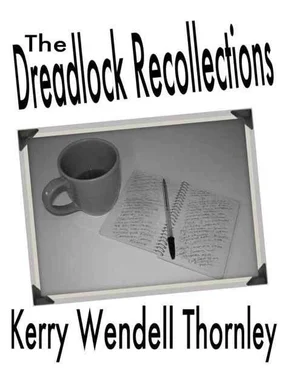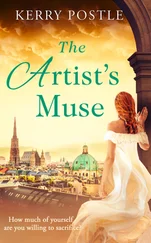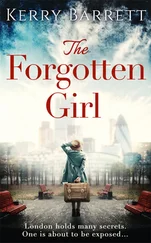Kerry Thornley
The Dreadlock Recollections
Kerry Thornley mentioned his book The Dreadlock Recollections as early as 1983 in his letters to me. Over the next eight years, until his death, he would send me quotes from the book or pages of his hand-written manuscript. It seemed to be a book eternally in revision. Fortunately Kerry's friend (and mine) Sondra London convinced Kerry to finish the book and then serialized it on the Internet. The OVO edition of The Dreadlock Recollections is based on Sondra's now-deleted online edition, with many significant additions made from the unpublished work Kerry sent me.
In the late 1980s I went to a bohemian area of Atlanta, Georgia Kerry often wrote about, Little Five Points, with the hope I could meet him. I found him sitting on the sidewalk selling his photocopied fliers and hand-written manuscripts, talking to himself. He kept talking to himself until I told him who I was. He smiled and said hello, seemingly glad to meet me. Then he resumed talking to himself. An hour later I told him I had to leave. He said goodbye, then resumed talking to himself. I don't remember any specifics of what he said but it was of a kind with much of this book, an ongoing externalized inner dialog about his frustration with the conspiracy that controlled his mind and his guilt over causing the major natural and human-made disasters in the world. What was lacking when I met him was his sense of humor, also found in this book, but perhaps I met him on a bad day.
I doubt nearly every claim Kerry makes in this book. The means to investigate these claims are at hand, and the reader is encouraged to do so. Also recommended is Adam Gorightly's book The Prankster and the Conspiracy: The Story of Kerry Thornley and How He Met Oswald and Inspired the Counterculture .
— Trevor Blake
Let the reader understand I possess nothing resembling a photographic memory. How unreliable my recollections sometimes are is driven home to me whenever I attend the same movie a second time. On the other hand I seem to have a very good memory for things most people are inclined to forget until, many years later, I remind them of this or that incident.
I am using quotations to convey a sense of the conversational dialogue that took place in New Orleans in the early sixties. That way I am able to capture the mood of each personality and situation much more accurately than would be possible simply describing, in a general way, what happened. Yet by no means am I at this late date able to present anything like a word-for-word transcript of what was said.
Most of my memories of these talks were repressed completely for many years. In 1975 I recalled only that Slim Brooks had a weird brother-in-law who seemed obsessed with Nazism and who spoke once or twice of killing John Kennedy, and that I had decided he was just putting me on.
In the spring of 1959 I was stationed at an annex of El Toro Marine Base in California. Another Marine in that unit was Lee Harvey Oswald. We became acquainted.
Then in June of that year I shipped out for a tour of duty at the Navel Air Station in Atsugi, Japan, where Oswald served previous to our time together at El Toro.
My ambition all along was to become a novelist, and I had decided to write a book based upon my overseas experience in the military. That autumn I read in the newspaper that Lee Oswald had, upon being discharged, gone to Moscow and applied for Soviet citizenship. By then I'd decided to call my novel about peace-time Marines in the Far East The Idle Warriors and Oswald's dramatic act inspired me to center the plot around a character based on him.
Convinced that I understood his reasons for becoming disillusioned with the United States and turning to Marxism, feeling they were similar to my own, I at first intended to write "a poor man's Ugly American " sharply critical of US imperialism characterized by the bungling of the Eisenhower era.
Unfortunately for the clarity of my novel's political theme, my own ideology shifted, as a result of reading Ayn Rand's polemical novel Atlas Shrugged aboard ship on my way back to the States. Discharged from the Marines immediately thereafter, I entered civilian life convinced of the efficacy of laissez-faire capitalism.
My young friend, Greg Hill, and I then traveled from our home town of Whittier, California, to the New Orleans French Quarter, where I continued work on the first draft of The Idle Warriors .
There I met the principal character of this work of nonfiction I call The Dreadlock Recollections , a man I am belatedly but firmly persuaded played a central role in organizing the assassination of President John F. Kennedy, for which I am equally certain Lee Harvey Oswald was framed.
During most of my life I have been inclined to reject conspiracy theories of history. Notwithstanding my willingness to admit that conspiracies exist, I felt that a grasp of political events depended upon an understanding of the power of ideas. In my view, conspiracies were insignificant. My tendency was to challenge the motives of conspiracy buffs when I did not, as was more often the case, question their mental health.
Two years later, when a Warren Report critic confronted me with the many discrepancies between the conclusions of the Warren Commission and the testimony and exhibits contained in the twenty-six Volumes, I could no longer hide from myself the probability that either Oswald was innocent or he had not acted alone.
Yet even then I did not want to think an elaborate conspiracy was involved. Maybe Lyndon Johnson or some of his Texas friends had arranged to kill Kennedy and perhaps it had not occurred to the Warren Commission to probe that possibility. A more complicated theory would seem paranoid.
Above all else, I did not want to seem paranoid.
One year elapsed between the time I began doubting the lone-assassin theory and the beginning of tribulations in my own life suffered at the hands of a man most journalists insinuated was a paranoid. First, District Attorney Jim Garrison made a bizarre attempt to recruit me as a witness for the prosecution in his probe of a New Orleans-based conspiracy to assassinate John Kennedy. When I expressed my unwillingness to cooperate, he accused me of working for the CIA and summoned me to appear before the grand jury.
After asking me what seemed like a lot of irrelevant questions, he charged me with perjury for denying, truthfully, that I had met with Lee Harvey Oswald in New Orleans during the months previous to the assassination. I had not seen Oswald in person, nor had I communicated with him in any other way, since June of 1959, at the latest.
Yet Garrison struck me as sincere. Moreover, his assistants showered me with any number of disturbing coincidences linking me to his assassination theory. I was at a loss to explain them, except in light of the notion that Jim Garrison's conspiracy theory was an elaborate paranoid construction.
This experience forced me to examine the evidence surrounding the events in Dallas more carefully than ever before. As a result, I became convinced not only that Lee Harvey Oswald had not acted alone but, moreover, that he was not even on the sixth floor of the Texas School Book Depository when the shots that killed Kennedy were fired. Yet, because I also had to cope with Jim Garrison's wild and irresponsible charges, I also became more certain than ever that paranoia was by far more dangerous than any actual conspiracy that might, from time to time, sabotage the normal functioning of history.
In other words, if conspiracies were significantly dangerous, it was because they tended to spawn paranoia.
Читать дальше












